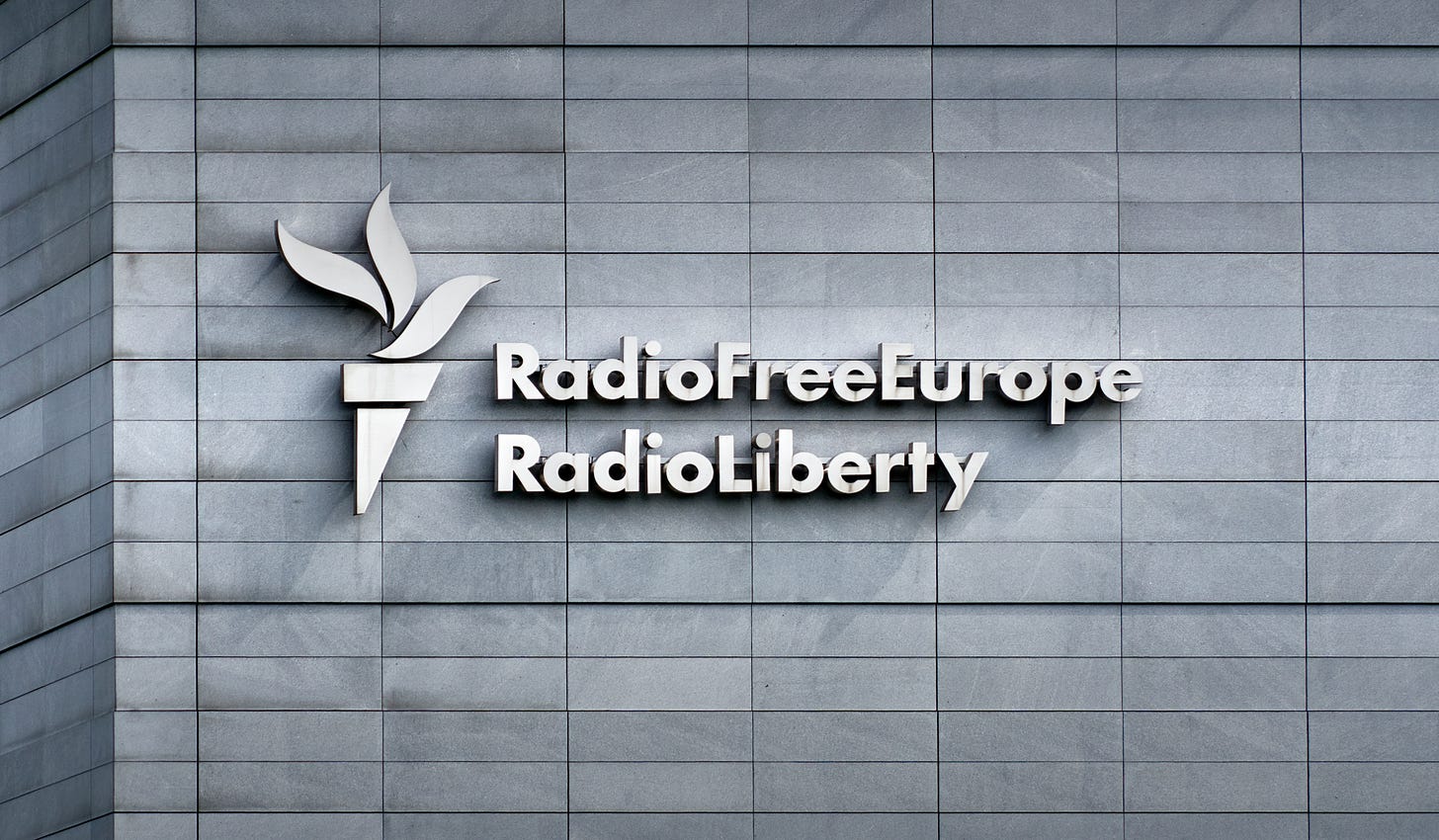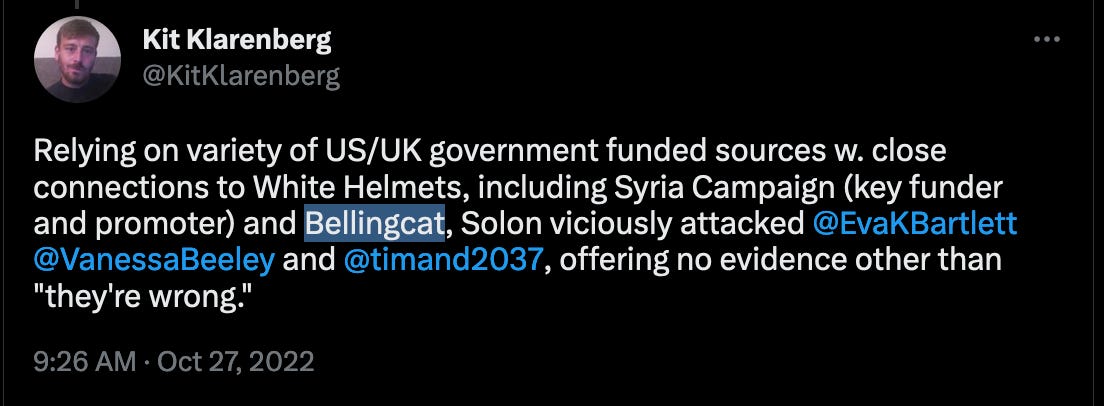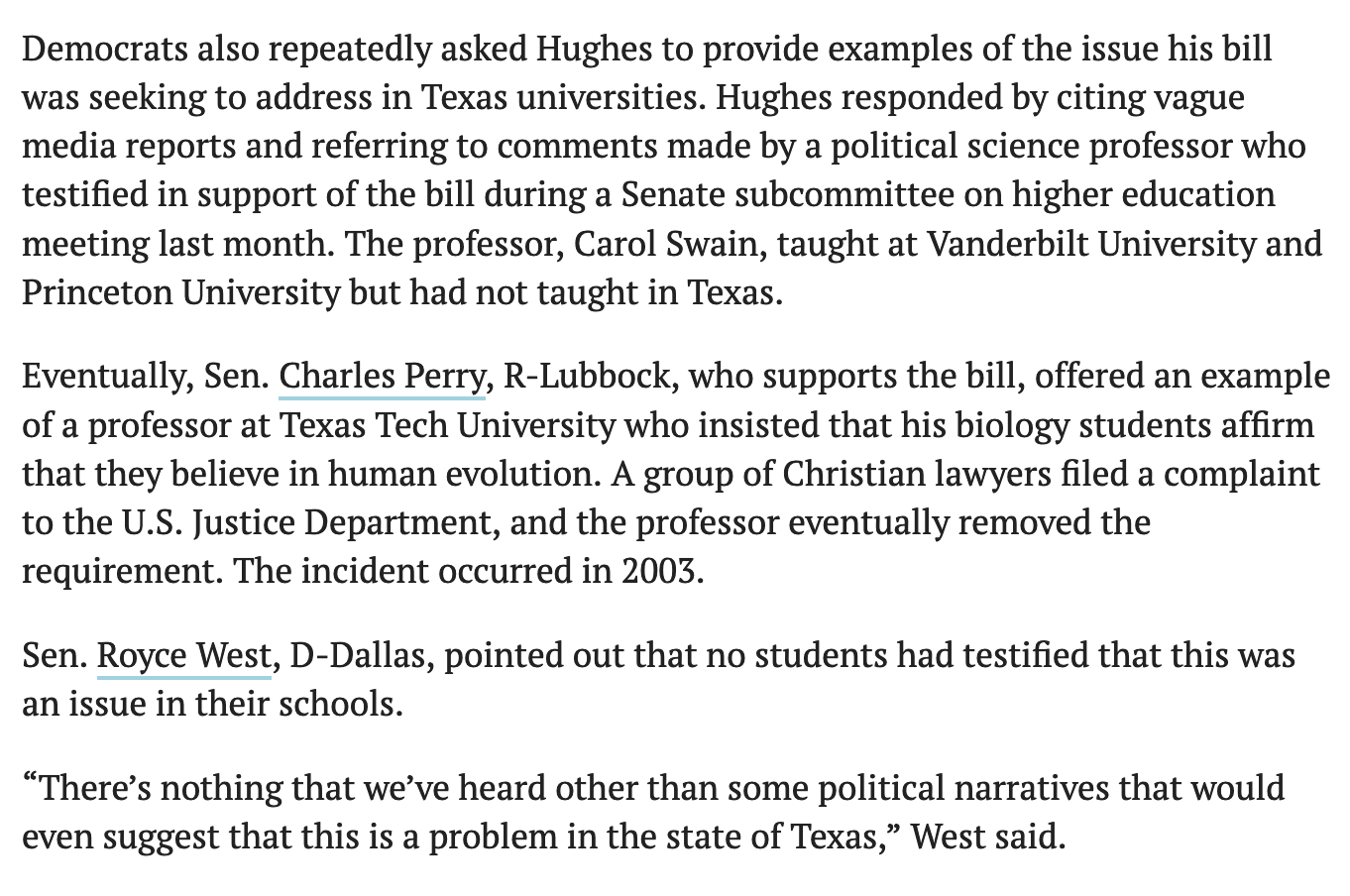The Moronic Cynicism of Equating Public Media to State Propaganda.
No, Western public media outlets are not equivalent to Pravda. Here's why.
“State-affiliated NPR!”
“NATO-cutout Bellingcat!”
“Government-controlled RFE/RL!”
“NED-backed….!”
Post anything at all that references a publicly-funded Western media outlet and expect to get swarmed by shrieking tankies accusing you of shilling for the CIA.
Never mind these same people will happily cite actual Kremlin-controlled media or even write for them. If you speak of any public news source in the West with anything other than scathing contempt, it is you who is the propagandist.
The issue has entered the spotlight over the past couple of weeks thanks to Elon Musk’s latest act of self-sabotage: Affixing a “state-affiliated media” label to the official Twitter account of National Public Radio (only a tiny percentage of whose funding actually comes from the state). The move ignited a debate over the accuracy of such charges and, in doing so, brought to the surface a good deal of smoldering idiocy.
Among the fascist-friendly segments of the right and (ostensible) left is a conceit that liberal democracy functions the same as dictatorship and that any claim to the contrary is hollow hypocrisy. Only they, moreover, are sufficiently clear-eyed to recognize it.
John Ganz brilliantly labeled this worldview “moronic cynicism,” a sort of faux-jadedness that masks a stunning naïveté about how the world actually works.
Here we get an insight into the unifying principle of all these supposedly disparate tendencies: a type of base, moronic cynicism. More than anything else, it is this moronic cynicism that takes itself to be devilish cleverness that is the governing ideology of the Russian state and society, and it attracts all its global admirers.
The cynical pose, which flatters itself on being always undeceived, is in practice highly gullible and distinguishable from naivety only in the sour churlishness of its affect.
As Ganz notes, this mindset, so common among the Russia-apologist crowd, mirrors that of the Kremlin. The latter excuses its naked authoritarianism and colonial land-grabs by deluding itself that the West, despite its lofty pretenses, is no different from itself.
At heart, though, it’s just an excuse to be a bunch of amoral assholes.
Nevertheless, while many readers might intuitively grasp the distinction between NPR and the Twitter feed of the Russian Ministry of Foreign Affairs, the precise nature of the difference might be less than obvious.
So I will try to explain it for you.
Consider Radio Free Europe/Radio Liberty (RFE/RL), one of the very best media sites in existence covering Eurasia. RFE/RL is entirely owned by the U.S. government. It is subordinate to the U.S. Agency for Global Media (USAGM), which supervises a number of other state-funded outlets such as Radio Free Asia, Voice of America (VOA), and the Middle East Broadcasting Networks.
RFE/RL was established during the Cold War to transmit radio broadcasts into communist Eastern Europe and the Soviet Union. Following the USSR’s collapse, it continued to operate in both broadcast and print, eventually expanding into Iraq, Iran, and Afghanistan.
I’ve been a fan of RFE/RL’s reporting ever since the late-1990s, when I began studying the post-communist countries. It is among the most sophisticated and reliable sources of news and analysis on the region.
Still, skeptics might wonder, if RFE/RL is entirely state-funded and overseen by a government agency, what makes it any more trustworthy than, say, RT, the Kremlin-owned news organization known for peddling Kremlin propaganda? The answer is that it operates independently.
Outlets such as RT are not merely funded and supervised by the state but controlled by it; the state actually interferes in its staffing and editorial content for political purposes. In the case of RFE/RL, no state agency does anything remotely equivalent. In fact, the very purpose of the USAGM is to protect America’s public news sources from such interference.
“Oh don’t be naïve, Neil. Don’t you understand that the state influence happens behind the scenes and away from prying eyes?” No, actually, I don’t. The reason why is that it would be impossible to pull this off without the whole world hearing about it.
You see, if the U.S. government ever tried to make politically-driven staffing changes at its public outlets or meddle in their editorial content, it would cause a scandal. We know this because it happened during the Trump administration.
In June 2020, Trump appointed former Claremont Institute president Michael Pack to head the USAGM. Pack immediately got down to work trying to turn the agency from a protective buffer against state interference into an instrument of it.
It did not end well for him.
Upon taking the reins at USAGM, according to the Washington Post, Pack “sidelined experienced managers, investigated a VOA reporter, and sought to steer the editorial direction of the news agencies—all in the name of rooting out what he called ‘bias’ against Trump.” He also purged the top ranks of RFE/RL, Radio Free Asia, and the Middle East Broadcasting Networks.
After a number of senior USAGM officials reported Pack for misconduct, he fired them. The officials then filed whistleblower complaints with the State Department’s Inspector General and Office of Special Counsel. They were vindicated in July 2021 when the Inspector General concluded they were fired in retaliation for their whistleblower conduct.
Needless to say, agency-purges, resignations, and whistleblower suits are newsworthy events. They will inevitably garner media coverage. And that’s exactly what happened in this case.
If your goal is to make public news outlets toe the government line, you won’t accomplish it with a few polite nudges here and there. It requires active and consistent interference in staffing and editorial decisions. As you might imagine, such interference will necessarily generate a lot of noise.
So if it were happening, we would know.
Most of the individuals Pack targeted were civil servants who saw themselves as duty-bound to protect media independence. Others were seasoned journalists who risk their lives to report from dangerous postings. They are not the kind of people who will go quietly into the night just because some country-club fascist tries to strong-arm them.
The U.S. government is capable of covering up a lot of things, but this is not one of them. The Michael Pack episode demonstrated as much.
Pack’s bid to turn these outlets into instruments of state propaganda may have been the most blatant such instance of political meddling, but it wasn’t the first.
In 2009, for instance, an official at the Office of Cuba Broadcasting dismissed a number of journalists at Radio and TV Martí, which broadcasts into Cuba. He tried to do so under the guise of budget-driven layoffs. But the employees contended they were fired in retaliation for having criticized his performance. So they sued—and won.
The point is not just that the reporters in question were able to use the courts to protect their independence; it’s also that the very attempt to exert political influence became a media event. We heard about it.
What’s more, there are laws guaranteeing the independence of the media organizations overseen by the USAGM. Consequently, the federal government is obligated to enforce those laws. In a 2022 report, the State Department Inspector General concluded that the USAGM was not doing enough to maintain editorial independence and journalistic standards. In other words, far from imposing a particular point of view on their reporting, the government routinely works to bolster their independence.
Needless to say, the idea that a Russian state agency would rebuke Sputnik News for being insufficiently independent is rather hard to fathom.
I’m not about to argue that all the news organizations that operate under the USAGM’s remit are exemplars of stellar journalism. The gap in quality between Radio Martí, known for its sensationalist editorializing, and RFE/RL is vast indeed. But no government agency leans on either to adopt a particular viewpoint. In the rare cases anyone tries, it becomes news. (Voice of America is unique in that it has a dual mandate to both report the news and communicate official U.S. policy. But none of the others are subject to that requirement.)
In fact, anyone who has ever read anything produced by RFE/RL would see that it’s not some crude propaganda organ. To the contrary, its work is sophisticated and nuanced. It not only displays meticulous adherence to the facts but also reports routinely on stories the government would prefer it didn’t. Examples of such coverage include the critical pushback by media advocates to the indictment of Julian Assange, denunciations by human rights groups over the continued operation of the Guantanamo Bay detention camp, and a 2018 Amnesty International report condemning the Trump administration for human rights abuses.
But that’s the thing: These nitwits who malign RFE/RL as unfiltered state propaganda have never actually read anything it’s produced; they just know it’s propaganda. You see, only they are smart enough to understand that all public media in liberal democracies are functionally equivalent to Pravda.
This sort of conspiratorial, too-clever-by-half thinking unites the MAGA right and tankie “left.” The right has no evidence that professors are indoctrinating students; they just know it’s happening. The left has no evidence the government is dictating RFE/RL’s coverage; they just know it’s happening.
It’s also convenient, since it frees them from the need to actually engage with state-funded reporting. “Oh, some Yale research lab issued an investigation into Russia’s child-deportation program but also received a State Department grant? Great! Guess I don’t have to read it!”
This gets to one of the core contradictions of the tankie crowd. On the one hand, they’ll adopt a hyper-skeptical attitude toward any data-point that contradicts their preferred narrative. “State-funded Bellingcat? Can’t trust anything it says.” But in truth, it’s just a pose designed to mask a laziness-borne allergy to the very idea of examining evidence. Who wants to bother with actual research into the Bucha atrocities when you can just rely on some Twitter rando’s false timeline exonerating Russia?
In the wake of his controversial decision to apply the “state-affiliated media” label to NPR’s Twitter account, Musk put his own moronic cynicism on blast for the world to see. He was sure there was no difference between publicly-funded and state-controlled media. But it turns out this certainty was based on…nothing at all.
The “moronic” in “moronic cynicism” really is the operative part of the phrase.










The shamelessness of the Grayzone dissembler is almost awe-inspiring. On the very day that Russian anti-war activist and journalist Kara-Murza is sentenced to 25 years, and Evan Gershkovich stands in a glass cage in a Moscow courtroom, Klarenberg shows up here to explain that when he was writing Russia-friendly articles for Russian state media, they never attempted to censor or control him. Imagine that. (Further context: All independent Russian media - all of it - has either forcibly gone silent or fled the country, and Reporters Without Borders classifies Russia as the most dangerous country in Europe for independent journalism).
Glenn Greenwald would say that RFE "elite journalists" & "Deep State" civil servants are part of the US foreign policy Blob that works with The Globalists/Military-Industrial-Complex. RFE/RL apparatchiks benefit from the US 'liberal international order' (that's actually just 'forever wars' to maintain a US unipolar world). Of course they'd whistle-blow "right-wing socialist" Trump appointees.
Matt Taibbi would say the same thing. Just with slightly less obvious Tankie pom-pom waving.